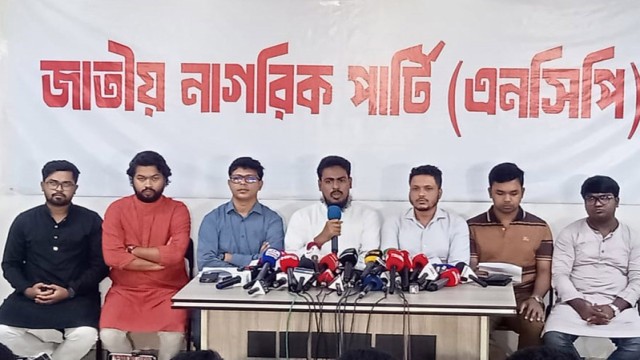
Photo: Ali Hossain Mintu
NCP Member Secretary Akhtar Hossain addresses a press conference in Dhaka, urging the formation of a Constituent Assembly to draft a new constitution for the sustainable implementation of the July Charter.
Dhaka, Aug 24 (V7N) – The National Citizens' Party (NCP) has raised concerns over the lack of a clear roadmap for implementing the July Charter, cautioning that the current approach—leaving major constitutional issues to future parliaments—will hinder sustainable reforms. Speaking at a press conference held at the party’s central office in Dhaka, NCP Member Secretary Akhtar Hossain urged immediate steps toward a Constituent Assembly to draft a new constitution.
The July Charter, a political agreement aimed at long-term structural reform in Bangladesh, has sparked nationwide debate. Although discussions through the Consensus Commission have covered a wide range of constitutional topics—including the separation of powers, women’s reserved seats, presidential authority, decentralization of the judiciary, and the prime minister’s term limits—Akhtar Hossain asserted that mere constitutional amendments would be inadequate.
“Without a permanent framework, any progress risks being reversed. A new constitution, developed through a democratically elected Constituent Assembly, is essential to ensure legitimacy and durability,” he said.
He also warned against repeating past constitutional missteps, referring to the controversial Eighth Amendment, which attempted to decentralize the judiciary by relocating High Court branches to divisional cities—only to be later declared unconstitutional. “Reintroducing such proposals without a clear legal foundation could trigger fresh constitutional challenges,” Hossain said.
In addition, the NCP rejected a proposal to rename the "July Charter" as the "National July Charter." Akhtar Hossain argued that the original title better reflects the revolutionary spirit and people's contributions that inspired the movement. “Adding the word ‘national’ risks diluting the emotional and political power of the original name,” he added.
The NCP’s position underscores a growing demand among political and civil society actors for deep structural change. According to Hossain, the commitments of the July Charter should serve as guiding principles for drafting a new constitution that cannot be easily challenged in court and that truly reflects the aspirations of the people.
As momentum builds around these demands, the future of Bangladesh's constitutional framework may hinge on whether such a democratic, inclusive process is undertaken.
END/AJ/SMA/

Comment: